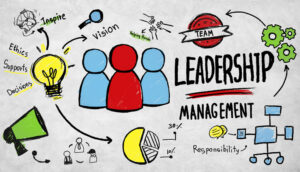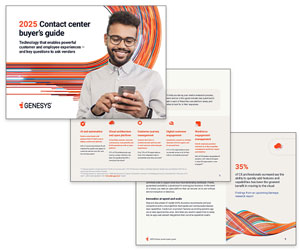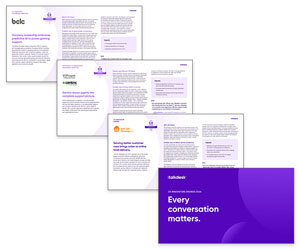Our readers share their top tips for improving your contact centre.
1. Train agents for empathy
There needs to be strong training in getting employees to put themselves in the customer’s shoes.
What would they want if they contacted a company? Someone who knows what is going on with their account.
With thanks to Gill
2. Understand the culture of communication platforms
We use emoticons in live chats to make the conversation more fun and more personal. But sending a 🙁 when advising someone their refund is declined is not recommended.
With thanks to Mea
3. Discover new ways to personalise your service
We’ve used intelligent routing in a sales environment to match the customer demographic with the most appropriate agent.
With thanks to David
4. Experiment with different approaches to training
I’ve found that doing basic training first, putting agents on the phone, with support, and then bringing agents back later for more complex training has improved performance and retention.
With thanks to Michael
5. Stay on top of customer expectations

Self-service is crucial in allowing your customers to have access to their accounts.
Quick and easy changes to account info, payment options and value adds are part of current demand, and will increase over the next few years.
With thanks to Allister
6. Embrace multichannel interactions
We currently get around 40% of our customer interactions via live chat, 50% via phone and only 10% via email. This is great for us as one agent can handle up to 5-6 chats at one time and we can use the chat to send links and videos.
With thanks to Mea
7. Help your staff to know the business
Encourage communication and face-to-face interaction with different departments. The building of relationships across the business can be hugely important in improving knowledge. The more this happens, the faster customers’ queries can be answered.
With thanks to Michael
8. Show employees that they are valued
I’ve had success motivating people by including them in decisions, projects, etc. They feel good about being included.
With thanks to Michael
9. Don’t forget off-site workers

Motivating remote agents can be more challenging, but it is still very important.
With thanks to Cindy
10. Find out who your customers are
We have a company-wide Identity Project to look at single customer view, which will really move us along when we introduce CRM!
With thanks to Craig
11. Get involved in group activities
We recently introduced daily ‘Fit To Fly’ sessions. Delivering them with energy and enthusiasm has a significant effect on performance.
With thanks to Michael
12. Be a ‘hands-on’ boss
Keep your door open; the leader must be available at all times.
With thanks to Hamesri
13. Make new technology customer-centric
Automation will only make customers’ lives easier if it is designed for the customers, not for the organisation. There also has to be a way for the customer to opt out of the automation.
With thanks to Candice
14. Be aware of agents’ capabilities
It’s important to realise that your best call handlers may not be good at other channels. If we are going to cross-utilise staff for multichannel work, we need to hire and train for that.
With thanks to Cindy
15. Research how to deploy new services

I feel that self-service is usually successful for generic solutions. Anything more complex often requires a human intervention.
Well thought-out call-flows can make the IVR experience a positive one.
With thanks to Christine
16. Keep moving
If you aren’t continuously improving, someone will replace you some day.
With thanks to Michael
17. It’s important how you leave customers feeling
Customers don’t buy products or services, they buy good feelings and solutions to problems!
With thanks to Alisha
Customers will always forget what you did for them but will always remember how you made them feel.
With thanks to Gill
18. Lead by example
Motivation will come from a great, selfless leadership team.
With thanks to Glendon
19. Cater to all preferences
When I ring a company, I want to talk to someone. If they need information to find me in their system I’ll happily give it to them rather than to an audio tape for three minutes. I want a person right away.
With thanks to Eric
20. Help customer to help themselves
We have an external knowledge base to allow customers to try and answer their own query before having to call.
With thanks to Carly
21. Keep it simple
Simplification is a key element to making customers’ lives easier. Customers are demanding ‘simple’. This is easier said than done, but automation can help.
With thanks to Rachael
22. Give customers the information they need
A previous company I worked for informed customers on their website what the current call queue time was with the contact centre.
A bit tough to see if the call queues are high, but it will help the customer to decide whether or not to call.
With thanks to Allister
23. Be careful when profiling customers

Profiling can be useful but agents need to realise each caller is different and may not fit into a standard profile.
We need to recognise and respond to individual callers.
With thanks to Cindy
24. Trust your front-line staff
Train front-line service staff to have more autonomy. If they can resolve customer issues you remove the need to escalate, thereby saving the customer time and achieving First Contact Resolution (FCR).
With thanks to Julie
25. Listen to your agent experts
Include the feedback from agents to make low-cost or no-cost improvements in your contact centre. They often have some very good workarounds that management is not aware of. Agents also don’t often raise these solutions as there is no formal process to do it.
With thanks to Christine
26. Be genuine with customers
Gone are the days of ‘feel-felt-found’. As a call centre agent, if you have not experienced what the customer is going through, don’t try to tell them you know how they feel. You can show empathy while being authentic.
With thanks to Glendon
27. Encourage group projects
I have created a tracker for improvements and things to look at to make them more effective/efficient. The team is the owner of the tracker and they update it. It helps to keep them motivated while improving the business and team bonding.
With thanks to Vanessa
28. Empower your agents
Allow and prepare the agent to own the customer’s issue, and have the agent say “I will take care of this for you.”
With thanks to Michael
29. Empowered agents lead to satisfied customers
If you do not empower the agent, you will not have a satisfied customer. Customer satisfaction can be the same as agent satisfaction.
With thanks to Amir
30. Be adaptable in your approach
If the customer wants rapport then this will come across in their tone of voice. The same applies for customers who just want their problems resolved quickly. Good customer service is about adapting to your customer and how they want the call handled.
With thanks to Michael
31. Know you customer’s requirements
You have to keep your client age group in mind, as older people tend to struggle with newer features, especially online portals.
With thanks to Mich
32. Train agents to a high level

Make simple query solutions simple for your customer. Train your agents on complex issues so when customers do contact, a smooth resolution can be achieved.
With thanks to Allister
33. Use the knowledge pool at your disposal
Document the tacit knowledge held by your top-performing agents so that this can be used as standard practice and is not lost when the agent leaves the company.
With thanks to Christine
34. Recognise the purpose of each channel
Speed depends on the channel – with social media channels customers demand speed. Contact centre KPIs demand speed, but customers demand getting the problem resolved.
With thanks to Rachael
35. Give trainees real exposure
Take potential agents on to the floor to listen to calls before they go into training. This makes training more relevant and ensures they feel comfortable with the role and environment.
With thanks to Nerys
36. Make full use of your data
Look at your highest call drivers and your highest AHT calls. Optimising these processes (or providing self-service) will either reduce AHT or lower your call volumes.
With thanks to Christine
37. Put managers into the thick of it
We moved all managers in to the contact centre. This gave a real sense of us all working as a team and questions could be answered faster. It also helped the managers understand the day-to-day work that was done by the agents.
With thanks to Kate
38. Check your metrics
Metrics need to balance operational efficiencies with service. Continually evaluate whether your current metrics are still the best metrics.
With thanks to Cindy
The metrics need to drive the right service, not just get calls finished as fast as possible.
With thanks to Kate
39. Give candidates a view of the role

We have prospective employees sit with agents in the contact centre prior to interviewing them so they have a better understanding of the position before they move forward with the selection process.
Some realise it’s not the job for them and it saves everyone time; others get excited and motivated by this experience.
With thanks to Cindy
40. Help staff to understand the product
Provide your products to agents for free or at a reduced rate so they can have a better understanding of the customer’s enquiries. Also, hire staff who mirror the characteristics of your customers.
With thanks to Michael
41. Know how the front line works
When building a new CSC, a manager should go through the initial training in order to have the same base knowledge as the agents and to better structure and program their training.
With thanks to Vanessa
42. Spread knowledge throughout the business
We have our salespeople sit with our agents when they come in for meetings. This helps them to better understand the customer challenges and the challenges our agents face.
With thanks to Cindy
43. Keep colleagues informed

Regular communication with your team and keeping them up to date with news and feedback (good or bad) builds your relationship with them.
This will give your team confidence in you, and if you can resolve their queries and questions in a timely manner then this will reinforce your authority.
With thanks to Michael
44. Poll your customers
Align your metrics to what your customers’ value the most. Just because we THINK we know what they want/expect doesn’t mean it’s really true!
With thanks to Liam
45. Appreciate your agents
Regular, genuine feedback is absolutely vital for building and maintaining a team.
With thanks to Sarah
A sincere ‘Thank You!’ is a great motivator.
With thanks to Cindy
46. Establish a healthy incentive system
Salary usually has a short-term effect, whereas employee satisfaction is perceived over a longer term. On the other hand, you must also understand if the staff turnover is healthy or not.
With thanks to Diego
47. Ask your customers what they value
Ask the customers what’s important to them.
With thanks to Ian
48. Involve all staff in training and development
We ask our team to help write our knowledge guides and to keep them up to date. They get used more as the team share them with new team members and point out key things (often the things they have added).
With thanks to Kate
49. Take nothing for granted – review your procedures
We review metrics all the time to make sure that they are supporting great service. We achieve them and that is in part due to the fact that they are service oriented, so the team buys in to them.
With thanks to Kate
50. Be realistic with customers
Some queries cannot be resolved immediately due to legal/compliance issues. The key is to manage expectations about turnaround times for resolution. Companies often do this badly and leave the customer frustrated.
With thanks to Christine
7 Bonus Tips to Transform Your Contact Centre
We recently went out to our readers to ask them what we should be analysing to positively transform contact centre performance.
Here are some of the best pieces of advice that we received.
Bonus Tip #1 – Always look at the bigger picture
While journey tracking is a great way to isolate the best starting point for analytics. Don’t let it distract your focus from the bigger picture.
It’s all too easy to focus on one small issue without looking wider impact of resolving it.
Bonus Tip #2 – Don’t confuse channel shift with demand reduction
Remember channel shift is not demand reduction unless its a fully automated channel. It may offer AHT benefits but it also often increases.
With thanks to Alex
Bonus Tip #3 – Reassess your feedback and coaching approach
Don’t confuse ‘giving feedback’ with “coaching”. Telling someone where they messed up is not the same as coaching for improvement.
With thanks to George
Bonus Tip #4 – Be prepared for anything
Business continuity is something organisations should analyse with the coronavirus being a hot topic.
Also, there are constant crashes in the stock market – so big businesses should always be prepared.
With thanks to Lucy
Bonus Tip #5 – Learn from your mistakes
Bad customer experiences are our greatest source of learning. Find out what went wrong, how to fix it and how to prevent it in the future. Every piece of your raw data tells a story.
With thanks to Mohammed
Bonus Tip #6 – Improve metric reporting
Where possible provide your managers with their metrics in one place – the more places they have to look, the less likely they’ll use them effectively.
Bonus Tip #7 – Rethink your AHT focus
Focusing on AHT just as a number without understanding the customer journey it relates too can be counter-productive as you may impact CSAT by trying to reduce AHT on a journey that needs more time to resolve well.
With thanks to Isla
For more ideas of how to improve contact centre performance, read our articles:
- Maintaining a Call Centre Focus: Ten Tips to Preserve High Performance
- 31 Quick-Fire Tips: How to Improve Customer Satisfaction
- 10 Interesting Initiatives for the Call Centre
Author: Megan Jones
Published On: 3rd Feb 2016 - Last modified: 16th Mar 2020
Read more about - Hints and Tips, CX, Editor's Picks, Empathy, Empowering Agents, Metrics, Self Service, Team Management, Training





















